Nick Schuyler's Survival Story
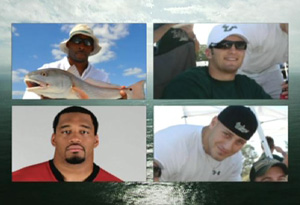
On February 28, 2009, four friends set sail for a day of fishing off the Florida coast. When they didn't return that night, the Coast Guard launched a massive search effort early the next morning despite stormy weather and violent waves. Forty-three hours later, the boat was found—but three lives had been lost. Only one man, Nick Schuyler, lived to tell the harrowing tale of his friends' fight for life.
Nick, a personal trainer, had befriended NFL players Corey Smith and Marquis Cooper at his gym. The three quickly bonded over intense workouts and lifting weights. Corey, the youngest of six children, had just finished his season with the Detroit Lions.
Marquis was married with a 3-year-old daughter he adored. An experienced fisherman, he often took friends out on his 21-foot boat. Set to leave for an off-season training camp with the Oakland Raiders, Marquis wanted to take his friends on one last trip to his favorite fishing spot, 70 miles off the Florida coast in the Gulf of Mexico.
When another friend dropped out of the trip at the last minute, Nick invited his best friend, Will Bleakley, to join them. Inseparable since their days playing football at the University of South Florida, Nick was excited to have Will along for the day.
No one could have foreseen the tragedy that lurked ahead.
Nick, a personal trainer, had befriended NFL players Corey Smith and Marquis Cooper at his gym. The three quickly bonded over intense workouts and lifting weights. Corey, the youngest of six children, had just finished his season with the Detroit Lions.
Marquis was married with a 3-year-old daughter he adored. An experienced fisherman, he often took friends out on his 21-foot boat. Set to leave for an off-season training camp with the Oakland Raiders, Marquis wanted to take his friends on one last trip to his favorite fishing spot, 70 miles off the Florida coast in the Gulf of Mexico.
When another friend dropped out of the trip at the last minute, Nick invited his best friend, Will Bleakley, to join them. Inseparable since their days playing football at the University of South Florida, Nick was excited to have Will along for the day.
No one could have foreseen the tragedy that lurked ahead.
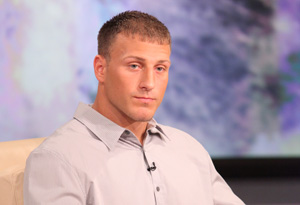
The men left a launch in Clearwater, Florida, at 6:30 a.m. Saturday. Nick says the fishing was good. "You dropped your line, a fish was coming out within minutes," he says.
The weather, however, was cold and the water was rougher than usual. "We talked earlier in the week that we might not go out that far because of that reason," Nick says.
Still, Nick says they decided to go all the way out. "It was one of his favorite spots," Nick says. "I'm not an avid fisherman, but he knew what he was doing. It was his last weekend before he left to Oakland for camp, and he wanted to make one last trip."
It took nearly four hours to reach the spot. Though they brought beer with them, Nick says there was no heavy drinking. "With the conditions going out there, that definitely was not the case," he says.
Nick says the choppy waters made him seasick. Feeling ill, he says he put on his ski jacket to warm up—a decision that later saved his life. Everyone else wore wind pants and wind jackets. "Marquis had shorts on," he says. "It was cooler out, but the sun was out a little."
In the late afternoon, the weather got colder and the wind picked up. "We knew a storm was coming," he says. "We knew that it was going to get rough out."
The weather, however, was cold and the water was rougher than usual. "We talked earlier in the week that we might not go out that far because of that reason," Nick says.
Still, Nick says they decided to go all the way out. "It was one of his favorite spots," Nick says. "I'm not an avid fisherman, but he knew what he was doing. It was his last weekend before he left to Oakland for camp, and he wanted to make one last trip."
It took nearly four hours to reach the spot. Though they brought beer with them, Nick says there was no heavy drinking. "With the conditions going out there, that definitely was not the case," he says.
Nick says the choppy waters made him seasick. Feeling ill, he says he put on his ski jacket to warm up—a decision that later saved his life. Everyone else wore wind pants and wind jackets. "Marquis had shorts on," he says. "It was cooler out, but the sun was out a little."
In the late afternoon, the weather got colder and the wind picked up. "We knew a storm was coming," he says. "We knew that it was going to get rough out."
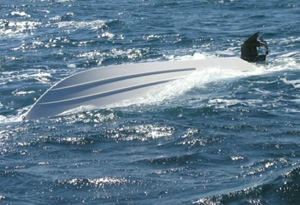
Photo: Florida Fish and Wildlife Conservation
At 4:15 p.m., Marquis decided to turn the boat around—but realized the anchor was stuck. Nick says the same thing happened the week before when he, Corey and Marquis were fishing in the same spot. They had to cut the line and leave the anchor behind.
This time, Nick says Marquis didn't want to lose another anchor. "We tried a couple different maneuvers and turned the boat around and pulled it from every which angle," he says. "At that point, I was pretty much worthless because I had been sick so long."
The anchor's rope was attached to the front of the boat. Will suggested untying the rope, reattaching it to the back and gunning the engine to move the anchor. "Our intention was, 'Okay, if we gun the motor, we're either going to rip this thing out or the line's going to snap,'" Nick says.
As Marquis gunned the engine, Nick says the boat began to flip. "Marquis was driving. Will was toward the middle of the boat, and Corey was on the opposite side of the boat. I was still sitting there by Marquis by the steering wheel," he says. "Within maybe two seconds, it slowly flipped."
Combined, the men weighed nearly 950 pounds. Nick says Marquis yelled for everyone to rush to the side rising above the water before the boat flipped, but it didn't work. "It was inevitable that it was going to flip," he says. "Who would think that a 1-inch rope would flip this big boat with four guys on it?"
This time, Nick says Marquis didn't want to lose another anchor. "We tried a couple different maneuvers and turned the boat around and pulled it from every which angle," he says. "At that point, I was pretty much worthless because I had been sick so long."
The anchor's rope was attached to the front of the boat. Will suggested untying the rope, reattaching it to the back and gunning the engine to move the anchor. "Our intention was, 'Okay, if we gun the motor, we're either going to rip this thing out or the line's going to snap,'" Nick says.
As Marquis gunned the engine, Nick says the boat began to flip. "Marquis was driving. Will was toward the middle of the boat, and Corey was on the opposite side of the boat. I was still sitting there by Marquis by the steering wheel," he says. "Within maybe two seconds, it slowly flipped."
Combined, the men weighed nearly 950 pounds. Nick says Marquis yelled for everyone to rush to the side rising above the water before the boat flipped, but it didn't work. "It was inevitable that it was going to flip," he says. "Who would think that a 1-inch rope would flip this big boat with four guys on it?"
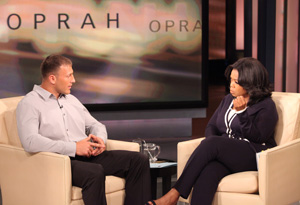
The men were thrown into 64-degree water. At first, Nick says the group thought they could flip the boat back over, but physics worked against them. "Me and Corey were toward the back of the boat and Will and Marquis were toward the top of the boat, and underneath the boat in those conditions, there's absolutely nothing to grab onto," he says. "There's absolutely no leverage."
Despite their best efforts, they couldn't flip the boat. "By that time, it was after 5," he says. "The waves were already crashing in."
Nick says Marquis kept apologizing. "'I'm so sorry you guys,' Marquis said after about a half hour in the water. He must have said it ten times. I think he felt it was his fault because he was the captain," he says. "There's these stories out there that Marquis was an inexperienced boater, which is absolutely not the truth. He knew what he was doing. He had been on the water a hundred times, a thousand times, and he was an experienced fisherman. "
As the men prepared for nightfall, Nick says Will took charge. He was able to swim underneath the boat several times and retrieve a ziplock bag with cell phones, wallets and keys, as well as three life vests and a floating seat cushion. Nick says Will gave everyone a life jacket and strapped the seat cushion onto his own back.
Despite their best efforts, they couldn't flip the boat. "By that time, it was after 5," he says. "The waves were already crashing in."
Nick says Marquis kept apologizing. "'I'm so sorry you guys,' Marquis said after about a half hour in the water. He must have said it ten times. I think he felt it was his fault because he was the captain," he says. "There's these stories out there that Marquis was an inexperienced boater, which is absolutely not the truth. He knew what he was doing. He had been on the water a hundred times, a thousand times, and he was an experienced fisherman. "
As the men prepared for nightfall, Nick says Will took charge. He was able to swim underneath the boat several times and retrieve a ziplock bag with cell phones, wallets and keys, as well as three life vests and a floating seat cushion. Nick says Will gave everyone a life jacket and strapped the seat cushion onto his own back.
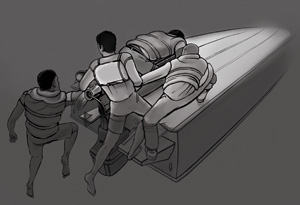
Illustration by John Aymong
As darkness fell, Nick says the men assumed their positions on and around the boat. Marquis was face-down, clutching a cooler on top of the exposed bow. Nick was next to Marquis, crouching with one foot on the hull of the boat and the other on the swim platform. At Nick's feet, Will perched on the swim platform next to the engine. At Marquis' feet, Corey held on to the boat, the only one submerged in water.
As conditions deteriorated, Nick says the waves threw them from the boat over and over again. "We'd hear them approach and scream, 'Hold on,' trying to brace ourselves."
Nick says he began to realize they might not survive. "I think everyone was starting to think to themselves, 'This is real. Oh my God. There's a good chance we might not make it out of this,'" he says.
Nick says Corey refused to give up. "Corey kept stating, 'No way in hell I'm going out like this.'"
As conditions deteriorated, Nick says the waves threw them from the boat over and over again. "We'd hear them approach and scream, 'Hold on,' trying to brace ourselves."
Nick says he began to realize they might not survive. "I think everyone was starting to think to themselves, 'This is real. Oh my God. There's a good chance we might not make it out of this,'" he says.
Nick says Corey refused to give up. "Corey kept stating, 'No way in hell I'm going out like this.'"
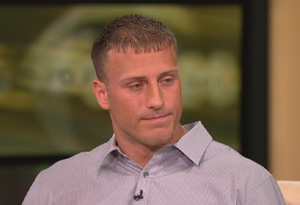
Nick says he tried to use their cell phones to call for help. "I'm sitting there trying to make calls or texts, and all it says was 'Connecting, connecting, connecting,'" he says. "There's no service. That was very, very frustrating. That's definitely an understatement."
As the men drifted in open sea, Nick says they became quiet. "We were all freezing and exhausted," he says. "Facing the possibility that we would all die left us almost with a guilty feeling about things we had left undone."
Nick says they talked about their families and what they would change in their lives. "[I was] thinking about my family and things I would change," he says. "Will had mentioned stuff about being closer to his brother, Blake. Marquis just talked about how much he loved [his family] and Delaney, his little girl."
As the men drifted in open sea, Nick says they became quiet. "We were all freezing and exhausted," he says. "Facing the possibility that we would all die left us almost with a guilty feeling about things we had left undone."
Nick says they talked about their families and what they would change in their lives. "[I was] thinking about my family and things I would change," he says. "Will had mentioned stuff about being closer to his brother, Blake. Marquis just talked about how much he loved [his family] and Delaney, his little girl."
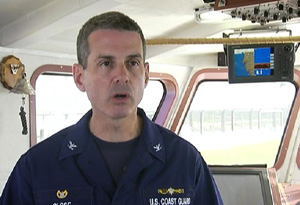
Back home, it had been hours since the men had been expected to return. At 1:27 a.m., Marquis' friend alerted the Coast Guard. "We were a little more alarmed than usual because we know that the weather had already started to pick up by 1:30," Capt. Timothy Close says.
The Coast Guard launched an all-out search at 2:37 a.m., but there wasn't much to go on. "We knew it was a single-engine boat. We knew the size of the boat," Capt. Close says. "We knew who was onboard the boat, but we didn't know where they were."
Authorities were also concerned about the overnight temperature, which had dropped to 40 degrees. Hypothermia was now these men's worst enemy. "All the processes in the body just slow down, so your mind starts to slow down and you cannot think," Dr. Mark Rumbak says. "One of the main symptoms of hypothermia is the hallucinations, and you could become very aggressive. You could just start fighting and you could start beating somebody up, or just slipping off your clothes and just running away. You just become very confused and [could] do something that may, in fact, cause your death."
The Coast Guard launched an all-out search at 2:37 a.m., but there wasn't much to go on. "We knew it was a single-engine boat. We knew the size of the boat," Capt. Close says. "We knew who was onboard the boat, but we didn't know where they were."
Authorities were also concerned about the overnight temperature, which had dropped to 40 degrees. Hypothermia was now these men's worst enemy. "All the processes in the body just slow down, so your mind starts to slow down and you cannot think," Dr. Mark Rumbak says. "One of the main symptoms of hypothermia is the hallucinations, and you could become very aggressive. You could just start fighting and you could start beating somebody up, or just slipping off your clothes and just running away. You just become very confused and [could] do something that may, in fact, cause your death."
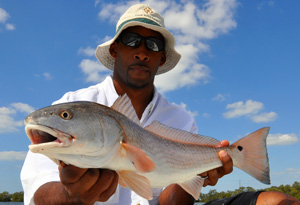
Photo: Clay Eavenson
Around 2:30 a.m. on Sunday, Nick says Marquis began acting differently. Though no one realized it at the time, hypothermia was wearing Marquis down. "Marquis began to get very quiet," Nick says. "So we'd be like: 'Coop! Coop!' And he wouldn't answer at first. ... Some time would pass, 10 seconds later, [he'd say], 'Yeah, I'm all right.'"
Marquis had been holding onto a cooler, which the group hoped to keep as an emergency flotation device in case the boat were to completely sink. "[He] started to lose some motor functions," Nick says. "So we had to make a decision to let go of the cooler once he started to lose some of those functions and wasn't able to fend for himself."
Nick says Marquis also began to hallucinate. "He kept saying things like: 'I need to get underneath the boat. I need to cut the rope. I need to get the anchor,'" Nick says. "At that point, I knew, okay, we're in deep trouble."
When Marquis tried to take off his life vest and swim below the boat, Nick says he and Corey had to restrain their friend. "That wasn't Marquis," he says. "That's not the kind of guy he is. The elements were definitely taking him in."
Nick says he did everything he could to keep Marquis from leaving the boat. "I positioned myself up on the boat where I straddled the motor. I had pulled him up with the help of the other guys, and I pretty much bear hugged him," Nick says. "[I told him:] 'Hold on. They'll be here any minute. Relax, Coop. You're good. We've got the anchor.'"
Marquis had been holding onto a cooler, which the group hoped to keep as an emergency flotation device in case the boat were to completely sink. "[He] started to lose some motor functions," Nick says. "So we had to make a decision to let go of the cooler once he started to lose some of those functions and wasn't able to fend for himself."
Nick says Marquis also began to hallucinate. "He kept saying things like: 'I need to get underneath the boat. I need to cut the rope. I need to get the anchor,'" Nick says. "At that point, I knew, okay, we're in deep trouble."
When Marquis tried to take off his life vest and swim below the boat, Nick says he and Corey had to restrain their friend. "That wasn't Marquis," he says. "That's not the kind of guy he is. The elements were definitely taking him in."
Nick says he did everything he could to keep Marquis from leaving the boat. "I positioned myself up on the boat where I straddled the motor. I had pulled him up with the help of the other guys, and I pretty much bear hugged him," Nick says. "[I told him:] 'Hold on. They'll be here any minute. Relax, Coop. You're good. We've got the anchor.'"
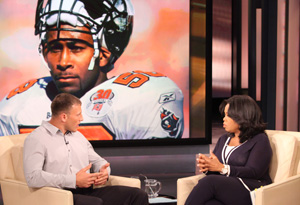
Around 4 a.m. on Sunday, Nick was still holding onto Marquis. "We had been in this position for roughly over an hour, and it was a fight [to hold him down]."
Then, at about 5 a.m., Nick says he noticed Corey was exhibiting similar symptoms. "Ninety percent of his body was in the water," Nick says. "So some of the things that Marquis had begun to form, as far as the motor functions and slurring, I think Corey was [experiencing] too."
After another 30 minutes, Nick says Marquis stopped fighting. He was dead. "Me and Will, a few times we had checked Marquis' pulse, and Will's like, 'He's not there,'" Nick says. "At that point, we tried to flip him over and give him CPR, which was virtually impossible with the waves."
As they tended to Marquis, Nick says a disoriented Corey became aggressive. "[Corey's] starting to fight as well. He's staring to get away, which once again was not Corey. The hypothermia was definitely set in," he says. "There was no way that I could hold onto Corey and Marquis at the same time."
Nick says he faced an impossible decision. If he didn't let Marquis' body go, he couldn't help Corey. If he held on, he could lose them both. "I just kept telling Coop, 'Coop, I'm so sorry,'" he says. "I had to let go."
Then, at about 5 a.m., Nick says he noticed Corey was exhibiting similar symptoms. "Ninety percent of his body was in the water," Nick says. "So some of the things that Marquis had begun to form, as far as the motor functions and slurring, I think Corey was [experiencing] too."
After another 30 minutes, Nick says Marquis stopped fighting. He was dead. "Me and Will, a few times we had checked Marquis' pulse, and Will's like, 'He's not there,'" Nick says. "At that point, we tried to flip him over and give him CPR, which was virtually impossible with the waves."
As they tended to Marquis, Nick says a disoriented Corey became aggressive. "[Corey's] starting to fight as well. He's staring to get away, which once again was not Corey. The hypothermia was definitely set in," he says. "There was no way that I could hold onto Corey and Marquis at the same time."
Nick says he faced an impossible decision. If he didn't let Marquis' body go, he couldn't help Corey. If he held on, he could lose them both. "I just kept telling Coop, 'Coop, I'm so sorry,'" he says. "I had to let go."
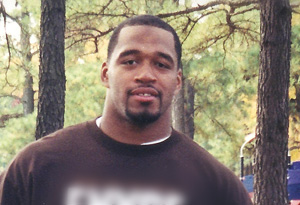
Around 5 a.m. on Sunday, Corey's condition continued to deteriorate. "It was definitely different from Marquis," Nick says. "[Corey] was very aggressive, screaming. Saying some things that I had never heard Corey even joke about. Which, once again, was not Corey."
Not in his right mind, Corey tried to escape the boat. "He is literally using his legs to leapfrog off the boat," Nick says. "So I'm holding on with my right hand, and he's shooting, so he's literally ripping my arm trying to get away."
Nick says Corey began speaking aggressively. Nick says he continued to hold on. "He had jumped one time across the back of the motor, and he had sliced my hand, sliced my arm on the motor prop," Nick says. In that moment, Nick says he let go of Corey.
Corey then jumped into the water. "He's roughly 6, 8 feet off the boat," Nick says. "We couldn't reach him at that point."
Nick and Will screamed as Corey ripped off his life jacket and rolled his body forward in the water. "I guess he kind of did a swan dive and put his feet in the air and just kicked down," Nick says. "We didn't see him after two seconds."
Not in his right mind, Corey tried to escape the boat. "He is literally using his legs to leapfrog off the boat," Nick says. "So I'm holding on with my right hand, and he's shooting, so he's literally ripping my arm trying to get away."
Nick says Corey began speaking aggressively. Nick says he continued to hold on. "He had jumped one time across the back of the motor, and he had sliced my hand, sliced my arm on the motor prop," Nick says. In that moment, Nick says he let go of Corey.
Corey then jumped into the water. "He's roughly 6, 8 feet off the boat," Nick says. "We couldn't reach him at that point."
Nick and Will screamed as Corey ripped off his life jacket and rolled his body forward in the water. "I guess he kind of did a swan dive and put his feet in the air and just kicked down," Nick says. "We didn't see him after two seconds."
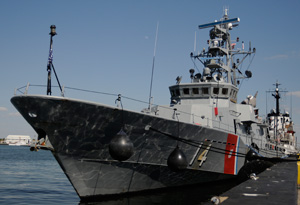
Photo: U.S. Coast Guard
Now, Nick was left with only his best friend in the world. "I was already straddling the motor, and he came behind me," Nick says. "Will was able to use his body and kind of lean with me, like if you were on a motorcycle."
Around 6 a.m.—24 hours since they left Clearwater—Nick says they waited for daylight to break. It never did. "The weather turned even worse," he says.
As the rain poured down, Will told Nick something he says he'll never forget. "He said, 'I don't think I'm going to make it another night,'" Nick says. "At that point I said, 'They're going to find us today.'"
Meanwhile, the Coast Guard had stepped up its rescue mission. Helicopters, planes and boats braved grueling conditions, including 14-foot waves and winds gusting at 30 mph. "There were huge numbers of white caps out there, so we were looking for one small white speck amongst millions of other white specks," Capt. Close says. "We were kind of looking for a fingernail in a shag carpet."
At 1:30 p.m. on Sunday, Capt. Close made an urgent call for a larger search boat. The Tornado, a 179-foot cutter, was dispatched from its location 20 miles off the coast of Cuba. "She was getting beaten pretty good coming up," Capt. Close says. "I give those guys a lot of credit for making that trip."
Around 6 a.m.—24 hours since they left Clearwater—Nick says they waited for daylight to break. It never did. "The weather turned even worse," he says.
As the rain poured down, Will told Nick something he says he'll never forget. "He said, 'I don't think I'm going to make it another night,'" Nick says. "At that point I said, 'They're going to find us today.'"
Meanwhile, the Coast Guard had stepped up its rescue mission. Helicopters, planes and boats braved grueling conditions, including 14-foot waves and winds gusting at 30 mph. "There were huge numbers of white caps out there, so we were looking for one small white speck amongst millions of other white specks," Capt. Close says. "We were kind of looking for a fingernail in a shag carpet."
At 1:30 p.m. on Sunday, Capt. Close made an urgent call for a larger search boat. The Tornado, a 179-foot cutter, was dispatched from its location 20 miles off the coast of Cuba. "She was getting beaten pretty good coming up," Capt. Close says. "I give those guys a lot of credit for making that trip."
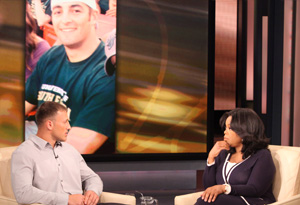
Through the day, Nick and Will saw helicopters in the far distance and did what they could to try and attract their attention. Tragically, they were no match for Mother Nature. Despite the 14-foot waves, Will managed to dive back under the boat and found one bottle of Gatorade and a plastic bag of pretzels.
Around 4:30 p.m. on Sunday, Nick realized an exhausted Will was beginning to slip away. "I had already had two guys die—one in my arms. I was in the middle of witnessing my best friend do the same," he says. "I was begging, 'God, please help.'"
Like Marquis and Corey, Nick says Will began to lose control of his body. Instead of becoming aggressive, Nick says Will just became completely defenseless. "[Earlier], we would fight the waves," he says. "There was a point where Will wasn't giving me anything."
The waves continued to batter the best friends, pulling them off the boat and into the cold, churning water. After awhile, Nick says Will could no longer pull himself back on the boat. "He didn't have the strength," he says. "I'm sitting here trying to pull up a 225-pound man with not a whole lot of leverage."
Then, Will lost his life jacket. "He went in [the water] one time, and his jacket [shot] up. It kind of choked him," Nick says. "His first reaction was, 'I'm going to take the jacket off.' So he took the jacket off, and within a few seconds that thing was yards away. I thought about going to get the jacket, but then I'd have to leave Will, jacketless, alone."
Around 4:30 p.m. on Sunday, Nick realized an exhausted Will was beginning to slip away. "I had already had two guys die—one in my arms. I was in the middle of witnessing my best friend do the same," he says. "I was begging, 'God, please help.'"
Like Marquis and Corey, Nick says Will began to lose control of his body. Instead of becoming aggressive, Nick says Will just became completely defenseless. "[Earlier], we would fight the waves," he says. "There was a point where Will wasn't giving me anything."
The waves continued to batter the best friends, pulling them off the boat and into the cold, churning water. After awhile, Nick says Will could no longer pull himself back on the boat. "He didn't have the strength," he says. "I'm sitting here trying to pull up a 225-pound man with not a whole lot of leverage."
Then, Will lost his life jacket. "He went in [the water] one time, and his jacket [shot] up. It kind of choked him," Nick says. "His first reaction was, 'I'm going to take the jacket off.' So he took the jacket off, and within a few seconds that thing was yards away. I thought about going to get the jacket, but then I'd have to leave Will, jacketless, alone."
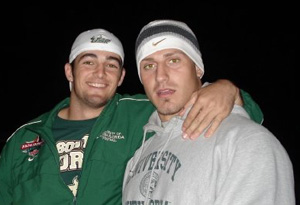
As the waves intensified, Nick fought to hold onto his weakened friend. "He was on one side of the motor. I was on the other. We both kept going under, and he was coughing," Nick says. "That happened probably five or six times. Then one time I was calling his name, and he was just not there."
Will was dead. Nick says he fought to hold onto his friend's body. "I was beyond devastated. I tried to climb back up on the boat holding a literally lifeless body," he says. "He just got away from me, and there wasn't a whole lot that I could do."
Nick says he could only watch as his friend's lifeless body slowly disappeared into the sea. "Will was not ready to go," he says. "I had to watch my best friend sit there floating in the water."
Although it was the worst moment of his life, Nick says he's grateful he got to say one thing to Will before he died. "[I said], 'I love you, man,'" Nick says. "And he said the same."
Will was dead. Nick says he fought to hold onto his friend's body. "I was beyond devastated. I tried to climb back up on the boat holding a literally lifeless body," he says. "He just got away from me, and there wasn't a whole lot that I could do."
Nick says he could only watch as his friend's lifeless body slowly disappeared into the sea. "Will was not ready to go," he says. "I had to watch my best friend sit there floating in the water."
Although it was the worst moment of his life, Nick says he's grateful he got to say one thing to Will before he died. "[I said], 'I love you, man,'" Nick says. "And he said the same."
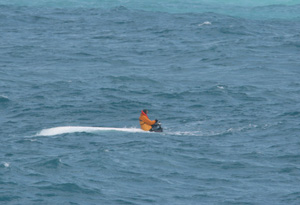
Photo: U.S. Coast Guard
Now the last man standing, Nick says he refused to give up. "I needed to live long enough to tell the story, even if I was found alive and died later. I felt useless and worthless. It seemed like every time I thought it couldn't get worse, it got worse. I hoped I would be found, but I experienced what no person should have to experience. It was awful. Three are gone. Now it's my turn. It's just a matter of time," he says. "I didn't have any choice but to go on. People say all the time, 'I can't, I can't, I can't.' But when you don't have any alternative but to go on, to keep fighting, you'd be surprised at what you can do."
Once the sun set, Nick fought to see another morning. At one point, Nick says he felt like he was dying. "My skin was very soft," he says. "I felt like if I had pinched my skin I was going to tear off layers of my skin right then and there. And I was bloody and I had begun to hallucinate."
Desperate to survive, Nick says he tied his life jacket to the propeller and tried to dive below the boat to find food. Unsuccessful, he surfaced to find his life jacket had floated away. He swam about 50 yards, grabbed it and made it back to the boat, his heart pounding. "[I couldn't] catch my breath," he says. "Then about a half-hour passed. [My heart] finally slowed down. And then I felt myself just gasping for air. ... I was like, this is it." Nick drifted in and out of consciousness, rudely awakened every time he was thrown into the water by the waves.
Still, Nick says he wasn't scared. "I was very sad," he says. "I kept thinking about the guys, of course, and my family."
Eventually, Nick started his final prayers. "I kept picturing my family, my mother, particularly," he says. "I just could not picture my mother attending my funeral. That's by far the worst thing that any mother would have to go through."
Once the sun set, Nick fought to see another morning. At one point, Nick says he felt like he was dying. "My skin was very soft," he says. "I felt like if I had pinched my skin I was going to tear off layers of my skin right then and there. And I was bloody and I had begun to hallucinate."
Desperate to survive, Nick says he tied his life jacket to the propeller and tried to dive below the boat to find food. Unsuccessful, he surfaced to find his life jacket had floated away. He swam about 50 yards, grabbed it and made it back to the boat, his heart pounding. "[I couldn't] catch my breath," he says. "Then about a half-hour passed. [My heart] finally slowed down. And then I felt myself just gasping for air. ... I was like, this is it." Nick drifted in and out of consciousness, rudely awakened every time he was thrown into the water by the waves.
Still, Nick says he wasn't scared. "I was very sad," he says. "I kept thinking about the guys, of course, and my family."
Eventually, Nick started his final prayers. "I kept picturing my family, my mother, particularly," he says. "I just could not picture my mother attending my funeral. That's by far the worst thing that any mother would have to go through."

Photo: U.S. Coast Guard
On Monday morning, the weather finally broke and the Coast Guard intensified their search. After days of searching more than 24,000 square miles of ocean, a lookout made a miraculous discovery at 11:46 a.m. "It turned out to be the white upside-down hull of the boat," Capt. Close says. "Then they saw Nick sitting there with his life jacket."
Nick says he saw the Coast Guard's boat approaching but thought it was a hallucination. "I was like, 'There's no way,'" he says. "I kind of stood up for a second and I'm like, 'Thank you, God.' [I] took my jacket off, swung it around like a towel, and I just broke down."
Nick says he saw the Coast Guard's boat approaching but thought it was a hallucination. "I was like, 'There's no way,'" he says. "I kind of stood up for a second and I'm like, 'Thank you, God.' [I] took my jacket off, swung it around like a towel, and I just broke down."
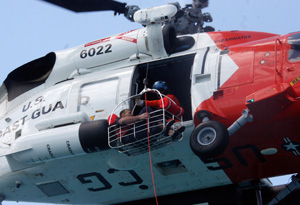
Photo: U.S. Coast Guard
Nick thinks getting seasick eventually helped keep him alive. "Getting sick that day had definitely saved my life, particularly with that jacket," he says. "Even though it was wet and cold, it insulated me."
Above all, Nick says Will's friendship kept him going. "Actually, Will had borrowed [the jacket] a couple weekends before, and I'd finally gotten it back that weekend," he says. "Of course, Will. Doing the things he did—the jacket and the Gatorade and the pretzels [kept me alive]."
Above all, Nick says Will's friendship kept him going. "Actually, Will had borrowed [the jacket] a couple weekends before, and I'd finally gotten it back that weekend," he says. "Of course, Will. Doing the things he did—the jacket and the Gatorade and the pretzels [kept me alive]."
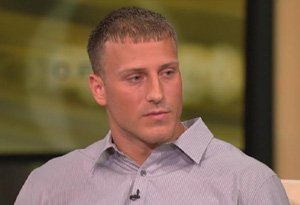
To dispel rumors of what happened that day, Nick has written a book called Not Without Hope, outlining his ordeal. "A few months after this accident, I was approached and they said, 'Here's the deal: They're gonna do a book, with or without you,'" he says. "I wanted to do it for the right reasons, for the three guys and their families."
Some of the family members involved believe Nick is profiting from their tragedy. Nick says the money doesn't matter to him. "The relationships with some of the families aren't where I would like them to be," he says. "But at the end of the day, I've said since day one, the most important thing for me has been the Bleakleys, the Smiths, the Coopers and the three guys."
Some of the family members involved believe Nick is profiting from their tragedy. Nick says the money doesn't matter to him. "The relationships with some of the families aren't where I would like them to be," he says. "But at the end of the day, I've said since day one, the most important thing for me has been the Bleakleys, the Smiths, the Coopers and the three guys."
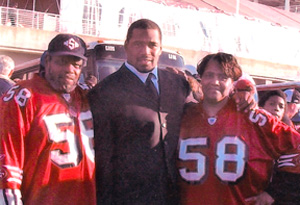
Corey Smith's parents say they are proud of everything he accomplished and say he's deeply missed by his brothers and sisters. His family also tells Oprah Show producers that Nick's depiction of his last hours isn't the Corey they knew.
The Smith family has issued the following statement:
“The family of Corey D. Smith would like to express our sincere gratitude for the outpouring of support and expressions of sympathy demonstrated by the many kind people across the country as well as the NFL and NC State families. To you we are forever grateful.
Although we have not read nor had input into Mr. Schuyler's book, we trust its emphasis is to bring greater awareness to water, fishing and boating safety to assure no other family will have to experience the loss our family has endured.
It has not been an easy year for any of us, and as we near the anniversary of the untimely loss of Corey, Marquis and Will, we believe that we each mourn privately, as there are mothers who have lost their son, children who have lost their father, siblings who have lost their brother and other relatives, friends, teammates and fans who have lost their hero.
Corey decided to go fishing with his friend and former teammate Marquis. Corey knew Mr. Schuyler very briefly and only through his association with Marquis. Regardless, Corey and Marquis were true comrades and enjoyed their last outing together. As we remember our fallen, we hope to continue to preserve Corey's character, accomplishments and spirit by raising safety awareness, giving back to the community and making a difference by planting seeds in the future of our young people.
May God continue to bless all of the families involved in hopes that we can move forward with sincere purpose and respect for one another and in honorable memory of Corey, Marquis and Will."
Nick says he knows it was the hypothermia acting out, not Corey. "Corey is just the big guy that everybody loved, the big teddy bear," he says. "[He] never has anything bad to say about anybody. Laughs. Listens a lot. He doesn't talk a whole lot. And just an outgoing, fun-loving guy."
The Smith family has issued the following statement:
“The family of Corey D. Smith would like to express our sincere gratitude for the outpouring of support and expressions of sympathy demonstrated by the many kind people across the country as well as the NFL and NC State families. To you we are forever grateful.
Although we have not read nor had input into Mr. Schuyler's book, we trust its emphasis is to bring greater awareness to water, fishing and boating safety to assure no other family will have to experience the loss our family has endured.
It has not been an easy year for any of us, and as we near the anniversary of the untimely loss of Corey, Marquis and Will, we believe that we each mourn privately, as there are mothers who have lost their son, children who have lost their father, siblings who have lost their brother and other relatives, friends, teammates and fans who have lost their hero.
Corey decided to go fishing with his friend and former teammate Marquis. Corey knew Mr. Schuyler very briefly and only through his association with Marquis. Regardless, Corey and Marquis were true comrades and enjoyed their last outing together. As we remember our fallen, we hope to continue to preserve Corey's character, accomplishments and spirit by raising safety awareness, giving back to the community and making a difference by planting seeds in the future of our young people.
May God continue to bless all of the families involved in hopes that we can move forward with sincere purpose and respect for one another and in honorable memory of Corey, Marquis and Will."
Nick says he knows it was the hypothermia acting out, not Corey. "Corey is just the big guy that everybody loved, the big teddy bear," he says. "[He] never has anything bad to say about anybody. Laughs. Listens a lot. He doesn't talk a whole lot. And just an outgoing, fun-loving guy."

Marquis Cooper was his parents' pride and his sister's biggest fan. His daughter, Delaney, was the joy of his life, and his wife, Rebekah, says she misses his smile and gentle spirit.
In response to Nick's book, Rebekah issued the following statement: "The last morning I saw Marquis, I kissed him goodbye and told him I loved him, as I have for years. My family and I didn't get the chance to bring him home, to lay him to rest. I've heard conflicting reports stemming from Mr. Schuyler of what happened on the day Marquis, Corey and Will died, but never once heard or been told of my husband's last words, whether he spoke of Delaney and I. How is it that Mr. Schuyler has enough recollection and material to write a book, yet has never once sat down with our family to tell us how Marquis died?
"Marquis was not an inexperienced boater or a careless friend. He was a husband worth fighting for in life, and in his absence still today."
Nick says he understands where Rebekah is coming from. Although they've spoken since the tragedy, he says he never felt the time was right to tell her about Marquis' final moments. "More than anything in this world, I would love to tell her the story, and I've always wanted to tell her the story," he says. "I'm willing to do whatever it takes."
Oprah says this is a lesson everyone facing loss can learn from. "For everybody, there comes a moment when things need to be said and everybody always wants to know the answer to the question, 'Why?' ... Particularly when somebody dies or there's an awkward situation. You don't know what to say, so you end up saying nothing. And then that nothing ends up creating really bad feelings because somebody should have said something," she says. "If you can, just say, 'I don't know what to say.'"
In response to Nick's book, Rebekah issued the following statement: "The last morning I saw Marquis, I kissed him goodbye and told him I loved him, as I have for years. My family and I didn't get the chance to bring him home, to lay him to rest. I've heard conflicting reports stemming from Mr. Schuyler of what happened on the day Marquis, Corey and Will died, but never once heard or been told of my husband's last words, whether he spoke of Delaney and I. How is it that Mr. Schuyler has enough recollection and material to write a book, yet has never once sat down with our family to tell us how Marquis died?
"Marquis was not an inexperienced boater or a careless friend. He was a husband worth fighting for in life, and in his absence still today."
Nick says he understands where Rebekah is coming from. Although they've spoken since the tragedy, he says he never felt the time was right to tell her about Marquis' final moments. "More than anything in this world, I would love to tell her the story, and I've always wanted to tell her the story," he says. "I'm willing to do whatever it takes."
Oprah says this is a lesson everyone facing loss can learn from. "For everybody, there comes a moment when things need to be said and everybody always wants to know the answer to the question, 'Why?' ... Particularly when somebody dies or there's an awkward situation. You don't know what to say, so you end up saying nothing. And then that nothing ends up creating really bad feelings because somebody should have said something," she says. "If you can, just say, 'I don't know what to say.'"
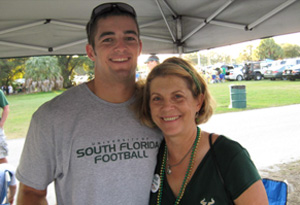
Will Bleakley's mom, Betty, says her son had a twinkle in his eye and made everything fun. She's grateful she told Will she loved him the last time she talked to him.
Nick says he told Will's parents how he died two days after his rescue. "I knew it was one of those things I had to do," he says. "I wanted to emphasize how without Will, I would not be having this conversation with you right now. Will saved my life."
Nick says he told Will's parents how he died two days after his rescue. "I knew it was one of those things I had to do," he says. "I wanted to emphasize how without Will, I would not be having this conversation with you right now. Will saved my life."
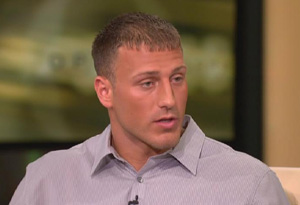
A year after the tragedy, Nick says he's doing okay. "Time definitely helps heal things," he says. "It will never be right, obviously, or feel right."
Nick says he hasn't seen a therapist. "I do talk to my friends and family," he says. "My friends and family have been out of this world. Without them, who knows?"
Though he's been back to the ocean twice, he says it wasn't easy. "Both times I went, the water had completely changed. It was so cold, it was so windy, it was so rough," he says. "It's hard to look at the water."
Nick says he thinks about Marquis, Will and Corey constantly. "I had only known Marquis for a little while, and Corey even shorter. ... Right away I knew there was something special about them," he says. "With Will, I still catch myself [asking,] 'Where's Will?' [while] doing little things. ... It's definitely been a struggle."
Nick says he hasn't seen a therapist. "I do talk to my friends and family," he says. "My friends and family have been out of this world. Without them, who knows?"
Though he's been back to the ocean twice, he says it wasn't easy. "Both times I went, the water had completely changed. It was so cold, it was so windy, it was so rough," he says. "It's hard to look at the water."
Nick says he thinks about Marquis, Will and Corey constantly. "I had only known Marquis for a little while, and Corey even shorter. ... Right away I knew there was something special about them," he says. "With Will, I still catch myself [asking,] 'Where's Will?' [while] doing little things. ... It's definitely been a struggle."
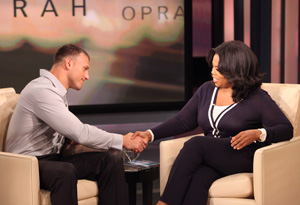
Nick says one of the reasons he wrote Not Without Hope was to help others avoid making life-threatning mistakes. Here's what the Coast Guard says everyone should take away from his story:
"The best thing to come out of this tragic case may be the lessons that other boaters can learn. Boaters should always leave a 'Float Plan' with someone ashore—including a description of the boat, names of the people onboard, where exactly they are going, and when they are expected back.
Boaters should always wear lifejackets. Additionally, every boat should carry an Electronic Position Indicating Radiobeacon (EPIRB). An EPIRB is water-activated and will broadcast an exact position via satellite to rescue centers.
Further, visual distress signals such as flares, strobe lights and even flashlights can be critical in helping the Coast Guard find someone in need of assistance.
Lastly, boaters are strongly encouraged to take boating safety classes available from a number of sources for minimal cost."
Read an excerpt of Nick's book, Not Without Hope
Remembering Marquis, Corey and Will
"The best thing to come out of this tragic case may be the lessons that other boaters can learn. Boaters should always leave a 'Float Plan' with someone ashore—including a description of the boat, names of the people onboard, where exactly they are going, and when they are expected back.
Boaters should always wear lifejackets. Additionally, every boat should carry an Electronic Position Indicating Radiobeacon (EPIRB). An EPIRB is water-activated and will broadcast an exact position via satellite to rescue centers.
Further, visual distress signals such as flares, strobe lights and even flashlights can be critical in helping the Coast Guard find someone in need of assistance.
Lastly, boaters are strongly encouraged to take boating safety classes available from a number of sources for minimal cost."
Read an excerpt of Nick's book, Not Without Hope
Remembering Marquis, Corey and Will



